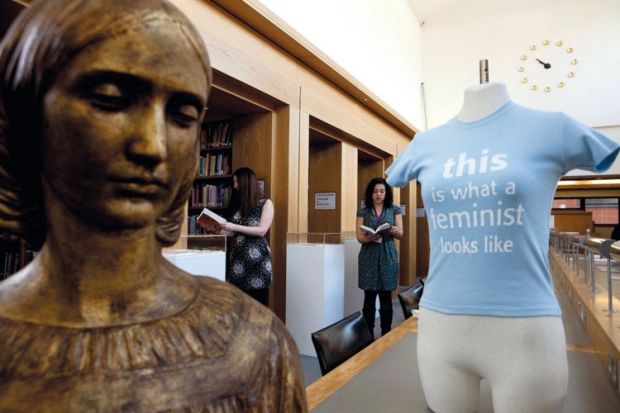Source: Teri Pengilley
Herstorical artefacts: the archive includes banners, diaries and databases
This week the London School of Economics will officially open a new reading room at the London School of Economics dedicated to The Women’s Library – part of far wider plans to enhance the research and teaching potential of this major collection.
The library started in 1926 with material about the suffrage campaign. It now includes more than 60,000 books and pamphlets, as well as badges, banners, photographs, posters and even a prison diary written in the margins of a volume of Shelley’s poetry, which illuminate virtually every aspect of women’s lives in the UK.
It was transferred from London Metropolitan University to LSE in January 2013. Along with the reading room, a teaching and activity room and a public exhibition space are due to open later this year.
In September, Mary Evans, centennial professor at LSE’s Gender Institute, hopes to launch a course of 18 lectures, open to all second- and third-year undergraduates, which will use the resources in the library to explore “the ‘woman question’ as it has been discussed and framed in the UK since the end of the 18th century”.
Lectures will explore, for example, the image of “the angel in the house” (and how this was linked to race and class); the legal status of women; the collusion of white women with racism; pacifist and militarist women; the role of men in feminist campaigns; and in what sense women “have come a long way”.
Engaging extensively with the collection would be valuable for students, argues Professor Evans, not only because it is intrinsically interdisciplinary but because they would be encouraged to “consider the extent to which an examination of original material can illustrate or question theoretical assumptions and judgements”.
Taking in The Women’s Library has almost doubled the size of LSE’s archive holdings. More than 300 items have already been selected to create an online timeline of “the battle for equality”.
“The projected budget for The Women’s Library @ LSE is more than £1.3 million,” said Elizabeth Chapman, director of library services. “In the past year, LSE Library has acquired a number of new materials, and we will continue to develop the collection so that it remains a vital resource for future generations of academic researchers.”
Early acquisitions have included a rare catalogue of the 1869 exhibition of the Society of Female Artists and a full-text database of more than 4,700 publications on women’s history from the period 1543-1945 known as the Gerritsen collection.
Priorities now include “capturing the born-digital material on feminism and women’s rights which might otherwise disappear”.





